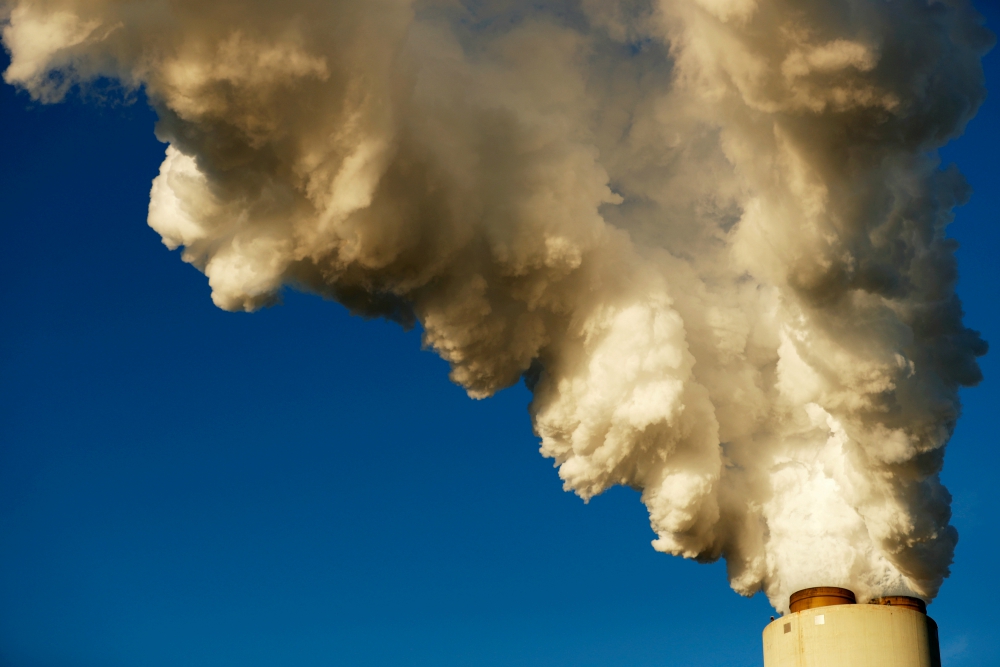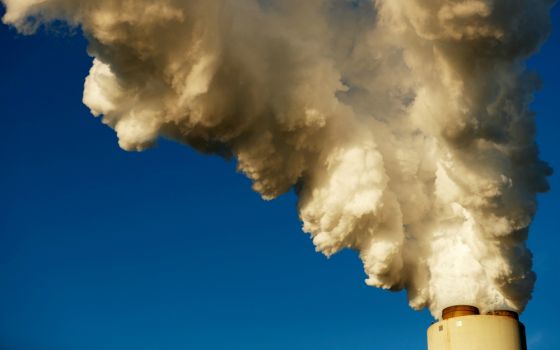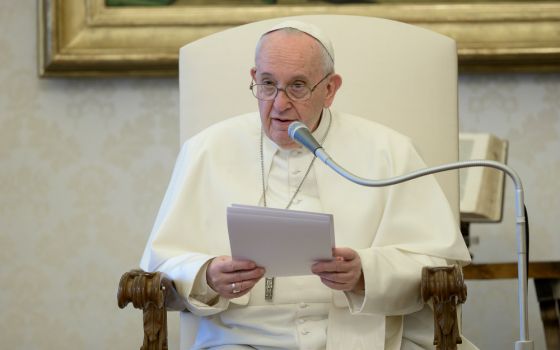
Smoke rises from Duke Energy's Marshall Steam Station, a coal-fired power plant in Sherrills Ford, North Carolina, Nov. 29, 2018. (CNS/Reuters/Chris Keane)
While the world struggles against a microbial and deadly menace, nature itself is under assault from threats coming in the other direction — the deliberate and steady overthrow by the Trump administration of environmental regulations, some in place for decades.
President Donald Trump's relentless attack on sane and enlightened environmental policy tramples years of intense work among environmental groups, U.S. industry and politicians of every stripe to achieve broad consensus on pressing issues. The attack also shreds the plea of Pope Francis' "Laudato Si', on Care for Our Common Home," the encyclical that gathers into one document Catholic thinking, accumulated over years, about the faith community's relationship to creation.
NCR staff writer Brian Roewe's exhaustive report on Catholic observation of the first Earth Day, on the 50th anniversary of that celebration, shows that concern for the environment has long been a constituent part of the Catholic understanding of right to life. All other life issues become meaningless if, in pursuit of economic convenience and dominance, Earth is destroyed.
As is the case with so much else occurring in government below the understandable daily din of news about the novel coronavirus, Trump's campaign to undo bipartisan accomplishments achieved over more than half a century draws little attention. It was under President Richard Nixon, who detailed elaborate plans for addressing environmental threats, established the Environmental Protection Agency by executive order in 1970. The agency went on to pass the Clean Air Act.
Trump's disdain for the environment is loudly announced by nature of the cronies he chooses to carry out his policies, chief among them the current EPA administrator, Andrew Wheeler, previously a lobbyist for the coal industry. Wheeler's predecessor, Scott Pruitt, a climate change denier, was hounded out of office in disgrace, under investigation for a range of conflicts of interest and spending scandals. The administration has also received all the help it's needed in this offensive against Earth from Republican members of Congress.
Last December, The New York Times published a detailed list of 95 environmental rules either rolled back or in the process of being rolled back.
The Trump anti-environment juggernaut has run into obstacles along the way, most often in the form of legal challenges, some of which have been successful. But the campaign is relentless and, in other ways, unrestrained.
Advertisement
The administration has targeted regulations responsible for cleanup of air and water that took years to achieve. It has rolled back workplace regulations that protected the health of workers and it has attempted to cut nearly all restraints on the use of pristine and previously protected lands for drilling and extraction operations.
Most recently, the EPA has targeted Obama-era regulations on the coal industry on whose behalf Wheeler once lobbied, regulations limiting mercury emissions from coal-fired utilities.
Releases of mercury, a toxin that causes brain damage and can be transmitted in food and fish contaminated by its release into the atmosphere, have been reduced from the major source of emissions, coal-fired power plants, by 85% in the past decade, according to environmental groups.
What's more, the nation's power industry said it's fine with mercury regulations as they are. The industry says it has invested $3 billion annually, below what it had originally estimated would be needed. Exelon, one of the nation's largest utilities, has called the Trump attempt to turn back the regulations "an action that is entirely unnecessary, unreasonable, and universally opposed by the power generation sector."
Said a spokesperson for the company, "And it works. The sector has gotten so much cleaner as a result of this rule."
Cutting into regulations on mercury emissions and reversing rules on emissions from autos and light trucks, both Obama-era environmental initiatives, are centerpieces of Trump's vanity project to eliminate the previous administration's progress. The activity also plays to a base and libertarian supporters who are indiscriminately opposed to government regulations.
But the perceived gains are demonstrably shortsighted, as countless analyses of long-term costs in health and environmental damage bear out. Beyond that, the auto industry, already geared up to produce more fuel-efficient and less polluting vehicles, will go through a period of uncertainty as legal battles over the rollback get underway.
It would have been difficult for Catholics observing Earth Day 50 years ago to imagine how much progress a country could make addressing environmental threats, nor how quickly and thoroughly that progress itself could be undone.





